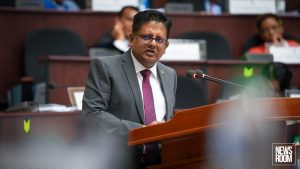Speaker not to blame for ‘corruption’ ban in Parliament – AG Nandlall

In a political debate that has ignited reactions across the country, Attorney General Anil Nandlall has come to the defense of Speaker of the National Assembly, Manzoor Nadir, following the recent ban on the use of the word “corruption” in parliamentary debates.
The controversy began when the Speaker of the House placed a restriction on the use of the term “corruption” in parliamentary discussions. This move was met with strong criticism, especially from the opposition APNU+AFC.
Member of Parliament Amanza Walton-Desir sent a letter to the Speaker, labelling the ban as “frankly absurd” and detrimental to the very purpose of the parliamentary system.
“How does one discuss combating corruption without being able to say the word?” Walton-Desir asked.
Nandlall, however, used his Tuesday night ‘Issues in the News’ commentary to clarify that the restriction on certain words, including “corruption,” is not an arbitrary decision by the Speaker but a longstanding practice rooted in parliamentary procedure.
According to Nandlall, every parliament, including Guyana’s, operates under a set of rules that govern language use, known as the “Standing Orders.” These rules, which date back to Guyana’s independence in 1966, include a glossary of prohibited words and expressions.
The Attorney General stressed that this practice is not unique to Guyana but is shared by parliaments across the Commonwealth, many of which inherited their parliamentary systems from Great Britain.
Nandlall referred to a book titled Parliamentary Practice by Sir Erskine May, which serves as a standard reference for parliamentary conduct. He explained that the restriction on words like “corruption” stems from a collective decision made by members of Parliament, not an individual action by the Speaker.
“It is hypocritical to blame the Speaker for enforcing rules that were created collectively by the members of Parliament,” Nandlall remarked.
“The Speaker is simply performing a role that has been assigned to him by the very rules that we, as members, agreed upon.”
According to Nandlall, the prohibition of certain terms is meant to maintain decorum and prevent inflammatory language during parliamentary debates. He also pointed out that any attempt to change the list of prohibited words must come from within Parliament itself, through a consensus among lawmakers.
Nandlall’s defense extended beyond the use of the word “corruption” to address broader concerns about parliamentary decorum.
He criticized those who have accused the Speaker of muzzling debates, emphasizing that the decision to ban specific words is not unilateral but a product of collective agreement among lawmakers.
The Attorney General also dismissed claims that the Speaker’s actions were politically motivated, calling out critics for unfairly targeting him.
Nandlall also addressed comments made by presidential aspirant Nigel Hughes, who criticized the Speaker’s decision on social media.
Nandlall expressed his disappointment, stating that Hughes, who once enjoyed considerable political goodwill, had recently made a series of controversial statements that, in his view, diminished his credibility.












